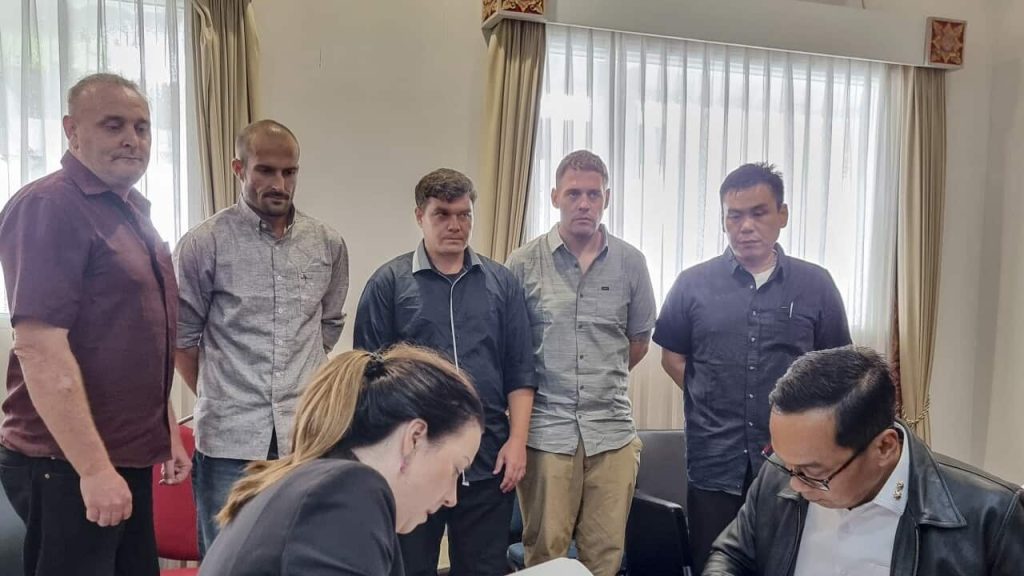The Bali Nine: Returning to Australia After 19 Years Behind Bars
Five convicted drug smugglers returned to Australia in an act of compassion by the Indonesian government face ongoing turmoil because of their years behind bars.
The men were part of the Bali Nine and had spent nearly two decades in Bali’s infamous Kerobokan Prison for their roles in attempting to traffic heroin.
Matthew Norman, Scott Rush, Martin Stephens, Si Yi Chen and Michael Czugaj — all now aged in their late 30s or 40s — returned to Australia after a deal with Indonesia to release the men, who had been serving life sentences on drug smuggling charges.
All the men had been serving life sentences on drug smuggling charges. Source: AAP / Roni Bintang/Made Nagi/Made Nagi/Mick Tsikas/Mick Tsikas
The long-term impacts of 19 years behind bars
The men would have had to cope with multiple stresses during their two-decade stint, said criminologist Clarke Jones, who has worked extensively with the Philippines and Indonesia justice systems.
This includes a highly overpopulated prison system and a lack of access to healthcare, hygiene and food.
High-level corruption would have made it hard to trust people, he said.
“I think 20 years in confinement in those high-security prisons in Indonesia would have been hell and they’ve well and truly done their time,” he said.
“It could have a long-lasting health impact and shorten life spans due to the stress they would have endured.”
With no halfway house, going straight from an Indonesian prison to life in Australia could be challenging, the criminologist said.
“I’d hope there’d be strong family or community support,” he said.
“They would need psychological support.”
A mixed reaction
The convicted drug smugglers have received a mixed reception, with some arguing they’ve done their time and others questioning the effort to bring them home.
Bayside Church pastor Christie Buckingham, who has long campaigned for their release, thanked Indonesian President Prabowo Subianto for the transfer.
Buckingham walked alongside Myuran Sukumaran — who was convicted as the Bali Nine ringleader — as his spiritual advisor in the final moments before his execution alongside fellow Bali Nine prisoner Andrew Chan by firing squad in 2015.
“It’s a moment which represents a second chance, an opportunity for these men to reintegrate into society, contribute meaningfully and demonstrate the growth they have undergone over two decades,” she said.
Prime Minister Anthony Albanese thanked Subianto for the men’s release, saying it was an act of compassion.
Albanese said their return on humanitarian grounds came after they “rightfully paid a serious price” for their crimes.
“But it was time for them to come home,” Albanese told reporters in Sydney on Monday.
“I had the opportunity to speak to a number of the parents last night of these people.
“They are grateful that their sons have been able to return home.”
The men expressed their gratitude in a statement, saying they were “relieved and happy” to be back.
The men didn’t come back to Australia as heroes because they were convicted and sentenced for trying to import heroin, Opposition Leader Peter Dutton said.
However, he noted the sense of relief for their families.
“At a personal level, and for their families, particularly coming into Christmas, you can understand the excitement and the relief that they’ll have.”
What happens now
The five men were placed in temporary accommodation at a Defence accommodation facility at Howard Springs, Darwin, after arriving on Sunday and will be given government assistance to help them reintegrate into society.
The remaining Bali Nine members are staying in temporary Defence accommodation in Darwin. Source: AAP / Amanda Parkinson
Liberal senator Hollie Hughes was scathing of the men’s release, saying Australians doing it tough “will be just thrilled to know that their taxpayer dollars are going to pay for this”.
She said she felt for the families of people who lost loved ones to heroin addiction.
Australian ministers have denied a quid pro quo agreement but Indonesia’s senior minister for legal affairs Yusril Ihza Mahendra said the transfer was “reciprocal in nature”.
“If one day our government requests the transfer of Indonesian prisoners in Australia, the Australian government is also obliged to consider it,” he said.
The five men, who have not been pardoned, are banned from entering Indonesia for life.
Related

